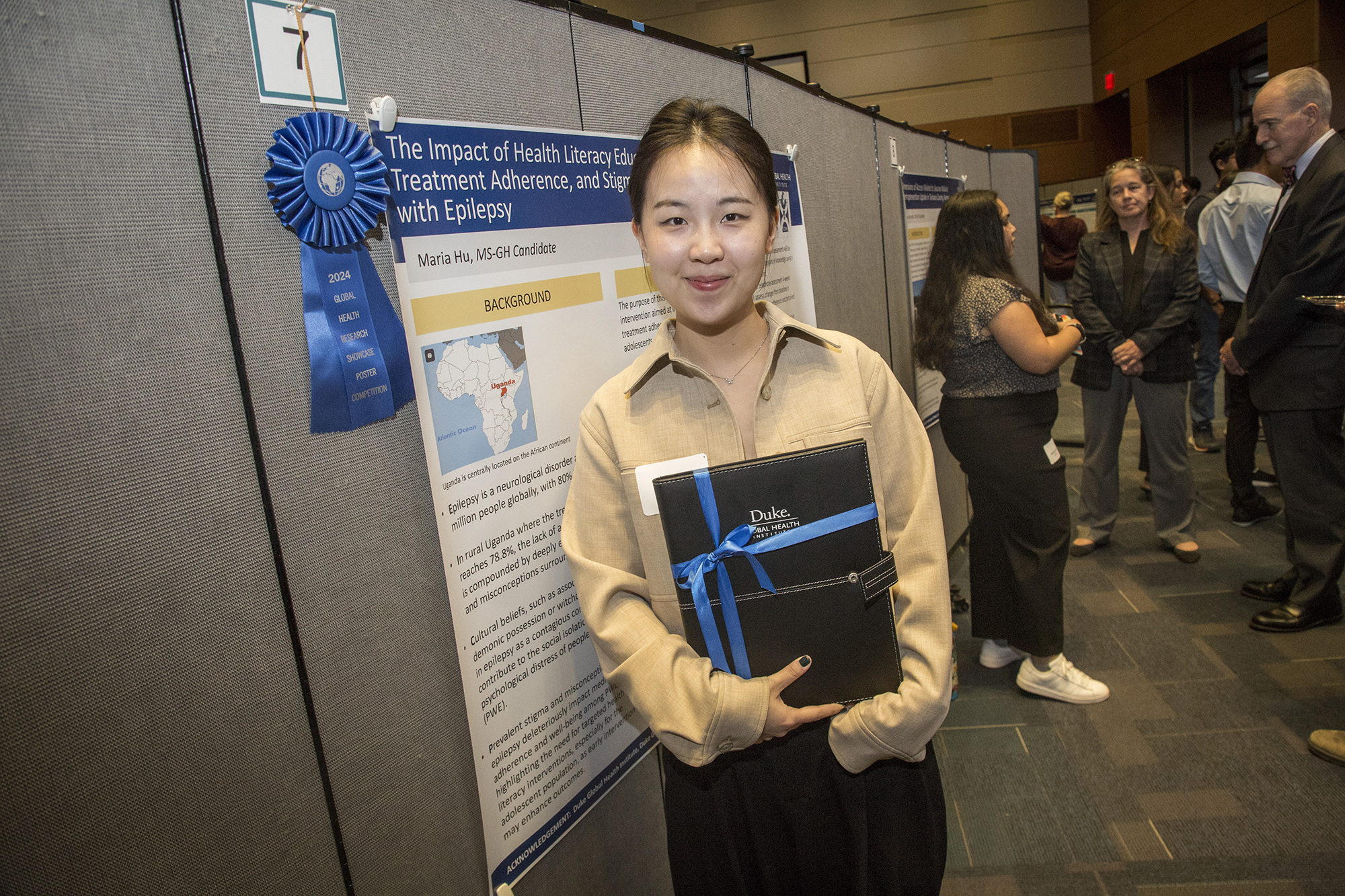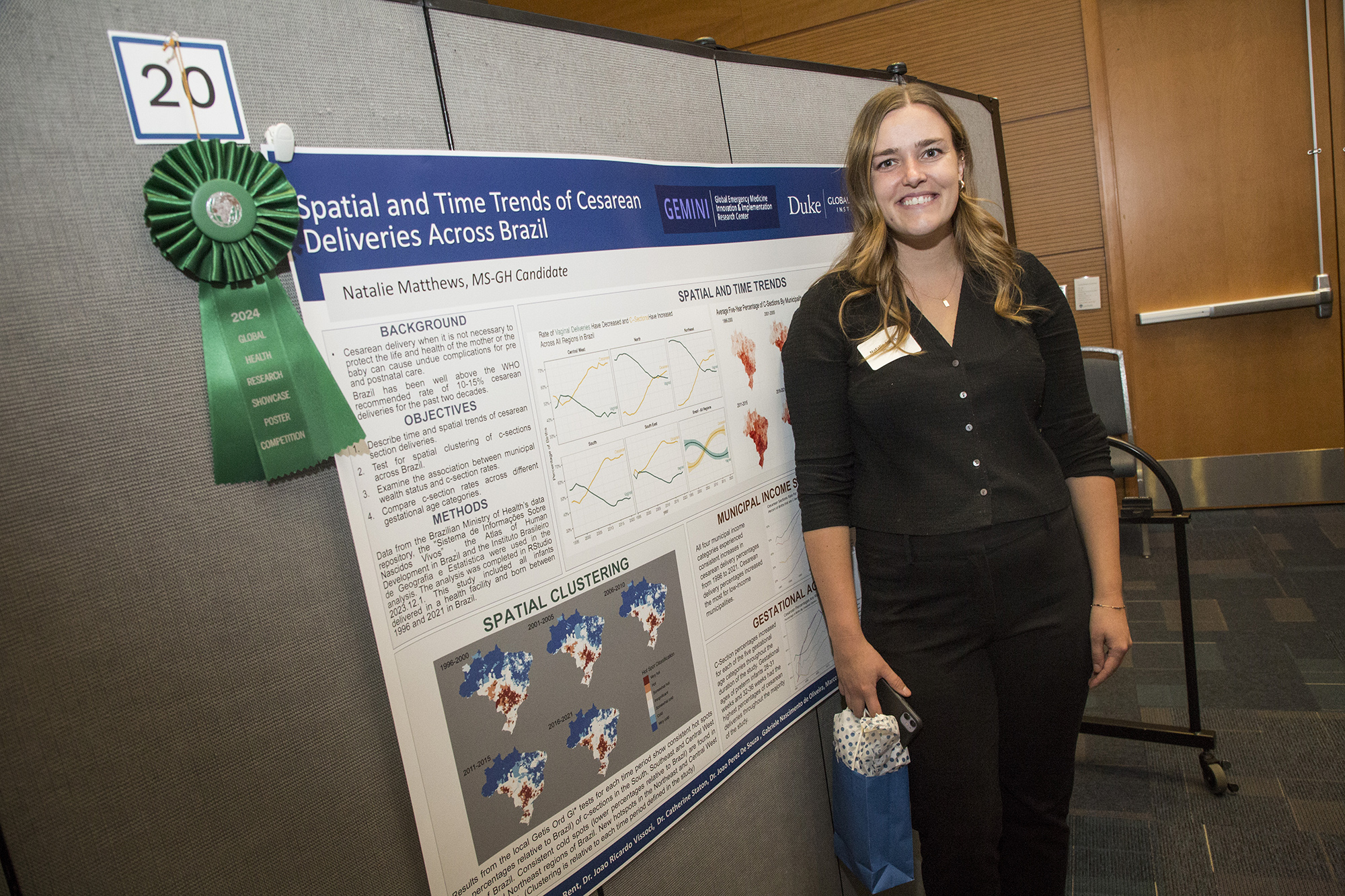
Paul Ngangula, a 2nd-year Master of Science in Global Health student, presents his research based in Tanzania to attendees at the 13th Annual Global Health Research Showcase. (All photos by Chris Hildreth/Rooster Media).
Published October 23, 2024, last updated on October 24, 2024 under Education News
Jump to Poster Award Winners >
Anna Tavormina has gone to great lengths to explore her interest in immune responses to noncommunicable diseases. Tavormina, a second-year student in the Master of Science in Global Health (MS-GH) program at the Duke Global Health Institute, spent several weeks this summer in remote northern Kenya, where she studied levels of C-Reactive Protein (CRP) in the Daasanach, a semi-nomadic pastoralist tribe who live in the region.
Reaching the tribe took days of traveling off main roads, where drivers used machete-like tools to cut through thick brush. Solar panels provided the only source of electricity, and Tavormina sometimes could not record data electronically when clouds covered the sun. But the difficulty of the research allowed her to form a deep connection with the team in the field, she says.
“I was working in one of the most extreme environments, but it was powerful working with amazing colleagues,” she says. “They were the people who kept me safe, made sure I had clean water and food. There was no way to do this work if one team member was missing. I felt part of the research community in every way.”
Tavormina was one of more than 45 students who presented at the 13th annual Global Health Research Showcase, a DGHI event spotlighting student-led field research. Students shared data, research methods and initial findings on a range of global health topics, including the needs of migrant workers, childhood obesity, adolescent pregnancy, malaria and mental health.
The students’ posters and background about their research projects can be seen on the Showcase page.

DGHI Director Chris Beyrer addresses...
In remarks at the event, DGHI Director Chris Beyrer, M.D., applauded the presenters for taking on a broad range of complex global health topics and for maintaining a focus on advancing health equity for the communities in which they worked. He relayed the appreciation that many of DGHI's global partners have shared with him about the students' efforts.
“They bring this up all the time that Duke students are fantastic, your inputs are valuable, and you bring a fresh prospective,” Beyrer said. “You all are ambassadors for this program. You do splendid work to help meet the unmet needs of people in these communities. That’s really a testament to all of you.”
Posters at the event represented field research projects completed in 16 countries, including Brazil, Panama, Uganda and South Africa. Thirty-one students in the MS-GH program presented, along with five undergraduate students and four groups from DGHI's Student Research Training program.
Joan Kimani, M.D., a student in the MS-GH program and a native of Nairobi, explored the relationship between waist-hip ratio and physical activity levels of patients undergoing cardiac rehabilitation in Eldoret, Kenya. She says projects such as hers put a focus on communities that don’t always benefit from academic research.
“People in Africa are underrepresented in research, and I wanted to do my work in Kenya – my home,” Kimani notes. “There’s a real relationship between physical activity and cardiac outcomes. This is going to help with predictive analysis of patients in the future.”
While Kimani was drawn to her roots, undergraduate students Sahil Choudhri, Kelsey Goldwein, Afraaz Malick and Skylar Webb leaned into their differences. Coming from different academic backgrounds, including public policy, environmental studies and computer engineering, they collaborated on an SRT project involving a mobile health app – mSaada – used by community health volunteers to expand cervical cancer screening and treatment in Kisumu, Kenya. Their research focused on improving the app in three areas: education, app functionality and data analysis.
Malick’s ties to the project are personal. His parents were born in Tanzania, which borders Kenya. And his mother is a breast cancer survivor.
“SRT was such a great opportunity to take a multifaceted approach to global health,” he says. “This program is a place where so many people can come work together and create a solution.”
While cervical cancer is preventable, it is a major health burden in low- and middle-income countries where access to treatment remains uneven. The project interested Webb because of its focus on addressing global health inequalities in sustainable ways, which mSaada provides through community involvement. The research experience showed her the importance of ensuring healthcare is accessible to all, no matter where they live.
“This is an area where our efforts need to be directed because we have the power to eliminate this, and it has such a devastating impact across the world,” Webb says. “Without the educational component, you won’t have an audience that understands the interventions and how to use it in their community. The power of education, with context, is important.”
Research Poster Awards
This year’s posters were judged by a panel of Duke alumni including several from DGHI’s master’s program. Judges evaluated the students’ work based on research aims and methods, the project’s scope and conclusions. The project’s visual clarity, appeal and creativity also factored into the panel’s final scores. This year’s winners are:
Graduate Student Posters
Undergraduate Student Posters

First Place
“Assessing Health Challenges and Disaster Preparedness in Pamlico County, NC” by Laura Brackett, Nia Capers, Praveen Dharmavarapu and Sophia Park, members of the DGHI Student Research Training program team in Pamlico County.
The team was advised by Sumi Ariely, an associate professor of the practice of global health, and Diana Silimperi, an adjunct professor with DGHI.

Second Place
“Using Heat Vulnerability Index to Analyze Low Birth Weight for Babies Due to Higher Temperatures Caused by Environmental Racism in Bronx County, Kings County New York County and Queens County,” by Vaughn-Regan Bledsoe.
Bledsoe completed this research project as part of Columbia University’s Mailman School of Public Health’s Summer Public Health Scholars Program in partnership with the Bronx Health Link.



